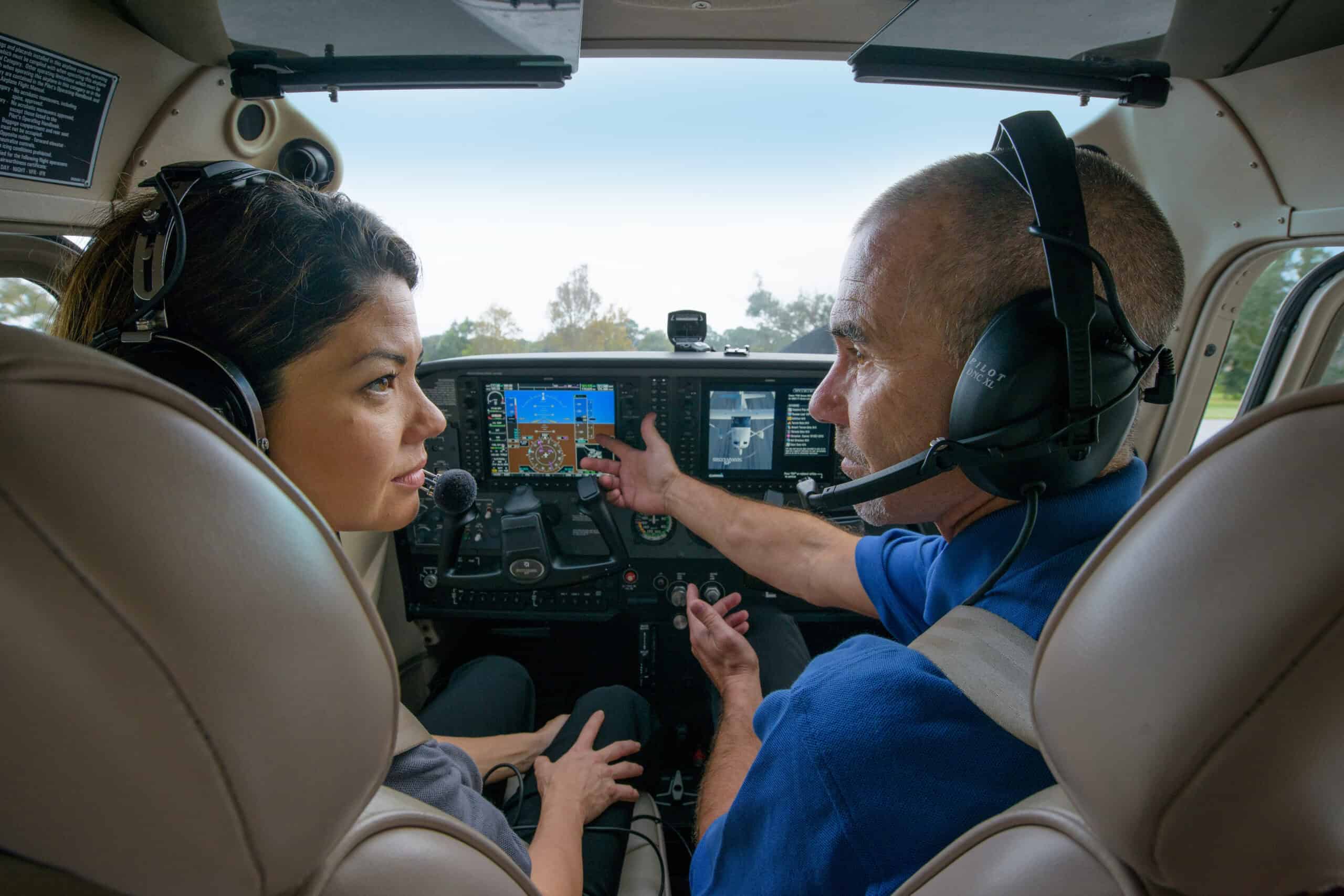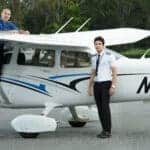Flight Instructor Certification: How to Earn It in 2025 – The Ultimate Guide

Flight instruction is more than just a profession—it’s a cornerstone of aviation. Flight instructors play a critical role in shaping the next generation of pilots, ensuring that they are not only technically skilled but also capable of making sound decisions in the air.
The demand for certified flight instructors has surged in India as the aviation sector continues to expand. With more airlines and DGCA-approved flying schools entering the market, the opportunities for qualified instructors are abundant.
Earning a Flight Instructor Certification is a significant milestone in an aviation career. It is a process that tests both knowledge and practical skills, requiring dedication, precision, and a passion for teaching. However, the rewards—both personal and professional—make the effort worthwhile.
This guide provides a clear roadmap for earning a Flight Instructor Certification in 2025, breaking down the requirements, steps, and opportunities in the Indian aviation industry. From understanding the DGCA regulations to selecting the right flying school, this guide is designed to simplify the process and equip aspiring instructors with the information needed to succeed.
What is a Flight Instructor Certification?
A Flight Instructor Certification qualifies experienced pilots to train aspiring aviators. It ensures instructors have the technical skills and teaching ability to guide students effectively.
In India, the Directorate General of Civil Aviation (DGCA) oversees flight instructor certifications, enforcing strict standards to maintain training quality and safety.
There are various types of certifications:
- Certified Flight Instructor (CFI): Focuses on teaching basic flying skills.
- Certified Flight Instructor – Instrument (CFII): Covers advanced instrument navigation.
- Multi-Engine Instructor (MEI): Specializes in training for multi-engine aircraft.
Each certification serves a specific purpose, ensuring instructors can meet diverse training needs and maintain high standards in aviation education.
Eligibility Requirements for Flight Instructor Certification in India
A Flight Instructor Certification is not handed out lightly. It’s a qualification that requires a clear understanding of aviation fundamentals, practical flying experience, and physical fitness. The Directorate General of Civil Aviation (DGCA) has established strict criteria to ensure only competent pilots earn this certification.
Educational Qualifications: The journey begins with a solid academic foundation. Applicants must have completed 10+2 with Physics and Mathematics. These subjects form the backbone of aviation theory, making them essential for anyone aspiring to teach flying.
Flight Experience: Experience in the cockpit is non-negotiable. Candidates must meet the DGCA’s requirements for logged flight hours, which typically include solo flights, cross-country navigation, and, for advanced certifications, multi-engine operations. Each of these components demonstrates a pilot’s ability to handle diverse scenarios, a critical skill for instructors.
Medical Fitness: Flying demands sharp reflexes, clear vision, and sound judgment, which is why the DGCA mandates a valid Class I Medical Certificate. This ensures that instructors are physically and mentally fit to take on the responsibilities of training future pilots.
These eligibility requirements form the foundation for aspiring flight instructors, ensuring they are well-equipped to uphold the safety and standards of aviation training.
Steps to Obtain a Flight Instructor Certification in India
Becoming a certified flight instructor in India requires a structured approach, following specific steps outlined by the Directorate General of Civil Aviation (DGCA). Each step ensures candidates are well-prepared to take on the critical role of training future pilots.
Step 1: Enroll in a DGCA-Approved Flying School
The journey begins with choosing a flying school approved by the DGCA. These institutions offer specialized training programs for aspiring flight instructors. Consider factors such as the school’s reputation, facilities, instructor expertise, and success rates before making a decision. Top flying schools in India, like Florida Flyers Flight Academy India, is a popular options for CFI training.
Step 2: Obtain a Commercial Pilot License (CPL)
A valid Commercial Pilot License (CPL) is a prerequisite for pursuing a Flight Instructor Certification. To earn a CPL, candidates must complete DGCA-mandated flight hours, including solo, cross-country, and instrument flying experience. This step ensures foundational expertise in piloting, which is essential for effective instruction.
Step 3: Complete the Flight Instructor Training Program
The next step is enrolling in a flight instructor training program. This program includes:
- Ground School: Covers aviation theory and instructional methods.
- Teaching Techniques: Develops skills for delivering lessons effectively to students.
- Flight Proficiency Training: Enhances flying skills with an emphasis on safety and instruction.
This training ensures candidates are equipped to teach students both in the classroom and in the cockpit.
Step 4: Pass the DGCA Flight Instructor Exams
The final step involves passing the DGCA’s written and practical exams. The written test evaluates theoretical knowledge, while the practical test (checkride) assesses instructional ability and flying skills. Preparation is key, and recommended resources include DGCA guides, mock tests, and mentorship from experienced instructors.
Following these steps ensures a clear path to earning a Flight Instructor Certification and stepping into a rewarding career in aviation training.
Cost of Flight Instructor Certification in India
Pursuing a Flight Instructor Certification in India is a significant financial undertaking, but it’s an investment in a high-demand profession. The costs are substantial but manageable with the right planning and financial aid.
Breaking Down the Costs
- Commercial Pilot License (CPL): The CPL is the foundation for becoming a flight instructor. Training costs typically range between ₹25–₹40 lakh, covering flying hours, ground instruction, and exam fees.
- Flight Instructor Training Program: Specialized programs for flight instructors add ₹5–₹10 lakh to the total, including advanced training in teaching techniques and instructional flying.
- DGCA Examination Fees and Miscellaneous Costs: Written tests, practical exams, and additional expenses like medical certifications and study materials can amount to ₹1–₹2 lakh.
Funding Your Certification
The costs may seem intimidating, but financial assistance options make it achievable:
- Scholarships: Some aviation academies and organizations offer merit-based scholarships to ease the financial burden.
- Government Aid: Programs like Skill India and state-sponsored schemes provide support for vocational training, including aviation courses.
- Education Loans: Banks and financial institutions offer loans tailored for aviation training. These often cover tuition, exam fees, and living expenses, with repayment plans starting after employment.
A Worthwhile Investment
While the financial commitment is high, the return on investment is promising. Certified flight instructors are in demand in India’s growing aviation sector, offering a rewarding career path with long-term growth potential. Planning ahead and utilizing available resources can make this goal attainable.
Top DGCA-Approved Flying Schools for Flight Instructor Certification
Finding the right flying school is like finding the right mentor—it shapes how you learn, how you teach, and how you grow in the aviation industry. In 2025, as the demand for flight instructors climbs, choosing the right DGCA-approved school becomes more than a decision; it’s the foundation of your career.
1. Florida Flyers Flight India, Hyderabad
When it comes to flight instructor training, Florida Flyers Flight India leads the pack. It’s the kind of school that doesn’t just churn out instructors; it creates professionals who are equipped to thrive in competitive environments.
- The school boasts internationally experienced trainers, an advanced fleet, and cutting-edge simulators.
- Its programs emphasize global standards of instruction, blending theoretical knowledge with practical application seamlessly.
- Students often rave about the school’s hands-on approach and its track record of high placement rates.
Florida Flyers isn’t just a school—it’s where ambition meets opportunity.
2. Indira Gandhi Institute of Aeronautics, Chandigarh
This institute has built its reputation on consistency and quality. With modern facilities and a strong focus on safety, it has been a reliable choice for aspiring instructors. Practical flying experience is at the heart of its programs, making it a solid contender.
3. Capt. Gopi Aviation Academy, Hyderabad
Capt. Gopi Aviation Academy has carved out a niche for personalized instruction. Its tailored programs and flexible schedules appeal to students looking for one-on-one mentoring, ensuring they develop the confidence to teach others effectively.
4. CAE Gondia (National Flying Training Institute)
A collaboration with CAE, a global leader in aviation training, CAE Gondia brings international standards to Indian aviation. From advanced simulators to seasoned trainers, this school excels in preparing instructors for both domestic and global markets.
5. Madhya Pradesh Flying Club, Indore
One of India’s oldest flying schools, MP Flying Club blends tradition with innovation. It offers cost-effective training without compromising quality, focusing on building a strong foundation for future instructors.
Career Opportunities After Earning a Flight Instructor Certification in India
Earning a Flight Instructor Certification opens the door to a dynamic and rewarding career in India’s rapidly growing aviation industry. With an increasing number of aspiring pilots and expanding airline operations, the demand for skilled flight instructors has never been higher.
The Demand for Flight Instructors
India’s aviation sector is booming. With the government’s push for regional connectivity and more people choosing air travel, the need for competent flight instructors to train new pilots is at an all-time high. This demand ensures consistent job opportunities and career stability for certified instructors.
Where Flight Instructors Work
Flight instructors in India have diverse employment options:
- Flying Schools: DGCA-approved institutions are always on the lookout for skilled instructors to train aspiring pilots.
- Airline Training Academies: Airlines often hire instructors to train recruits, particularly for instrument rating and multi-engine certifications.
- Private Training Institutes: Independent aviation training organizations provide additional opportunities for instructors to teach niche or advanced courses.
Earning Potential and Growth
The average starting salary for certified flight instructors in India ranges between ₹6–₹10 lakh per year, depending on experience and the hiring institution. Instructors working with airlines or high-profile training academies often earn more, with senior-level instructors making up to ₹18–₹25 lakh annually.
Beyond monetary benefits, the role of a flight instructor serves as a stepping stone for pilots aiming to accumulate flying hours or transition into other aviation roles, such as airline captains, examiners, or aviation safety experts.
The aviation industry’s upward trajectory ensures that flight instructors will continue to play a crucial role in its growth. For those passionate about teaching and flying, this career path offers not just financial rewards but the opportunity to shape the next generation of pilots and contribute to India’s expanding aviation landscape.
8. Challenges in Becoming a Certified Flight Instructor in India
The journey to becoming a certified flight instructor in India is rewarding but filled with challenges. These obstacles, while daunting, can be overcome with preparation, persistence, and a clear understanding of the path ahead.
Common Challenges
Financial Investment: The high cost of training, including earning a Commercial Pilot License (CPL) and completing the Flight Instructor Certification, often poses a major barrier. Additionally, expenses for medical exams, study materials, and DGCA exams add to the financial burden.
Stringent DGCA Requirements: Meeting the Directorate General of Civil Aviation’s (DGCA) strict criteria is a significant hurdle. From completing a set number of flying hours to clearing rigorous written and practical exams, the process requires precision and dedication.
Intensive Training: The training combines advanced flight skills with teaching methods, which can be mentally and physically taxing. Juggling ground school, simulator sessions, and practical flying often leaves little room for error.
Time Commitment: Becoming a certified flight instructor is a time-intensive process, taking several months to years, depending on individual progress. Balancing training with personal commitments can be challenging, particularly for those pursuing the certification alongside other responsibilities.
High Competition: With the growing demand for aviation professionals, the number of candidates entering the field has increased. Standing out among peers requires consistent effort, skill improvement, and networking within the industry.
Maintaining Motivation: The long journey, combined with the financial and physical demands, can lead to burnout or self-doubt. Staying focused and inspired throughout the process is often easier said than done.
Solutions to Overcome These Challenges
- Financial Assistance: Apply for scholarships, consider government funding programs, or secure education loans with flexible repayment terms.
- Strategic Planning: Break down the certification process into manageable steps to avoid feeling overwhelmed.
- Build a Support Network: Engage with peers, mentors, and professionals who can guide you through the challenges and keep you motivated.
- Practice Resilience: Embrace setbacks as learning opportunities, and remind yourself of the long-term rewards of becoming a flight instructor.
Becoming a certified flight instructor is a demanding process, but overcoming these challenges leads to a fulfilling career shaping the next generation of aviators.
Conclusion
Earning a Flight Instructor Certification in India is more than just a qualification—it’s a gateway to a fulfilling and impactful career in the aviation industry. The process involves understanding DGCA requirements, enrolling in a top flying school, completing rigorous training, and passing essential exams. Each step brings you closer to becoming a skilled instructor in India’s booming aviation sector.
With the demand for qualified flight instructors at an all-time high, obtaining a Flight Instructor Certification ensures a stable and rewarding career path. Certified instructors play a crucial role in shaping the future of aviation by training aspiring pilots, meeting the growing needs of flying schools, and contributing to airline training academies.
Contact the Florida Flyers Flight Academy India Team today at +91 (0) 1171 816622 to learn more about the Private Pilot Ground School Course.



